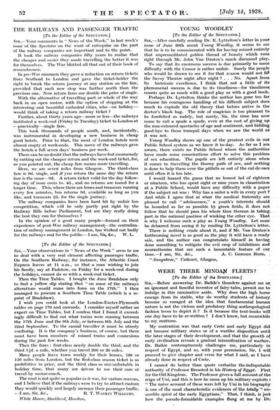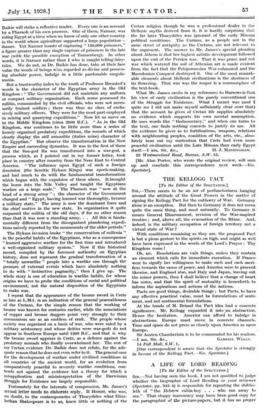WERE THERE MINOAN FLEETS ?
[To the Editor of the SPECTATOR.] SIR, Before answering Dr. Baikle's thunders against me as an ignorant and fanciful inventor of fairy-tales, permit me to indulge in this ruminative aside. Why does the high horse emerge from its stable, why do worthy students of history become so enraged at the idea that fundamental human, nature is not the vicious and predatory thing anthropological fashion loves to depict it ? Is it because the text-books will one day have to be re-written ? I don't know, but meanwhile to my. muttons.
My contention was that early Crete and early Egypt did not become military states or of a warlike disposition until the later stages of their development, and that the growth of early civilization reveals a gradual intensification of warfare. Dr. Baikie contemptuously challenges me, particularly in respect of Egypt, and so, with your permission, Sir, I will proceed to give chapter and verse for what I said, as I have already done in respect of Crete.
I cannot do better than quote verbatim the indisputable authority of Professor Breasted in his History of Egypt. First for the Old Kingdom. The Professor gives a full account of the reign of Uni, and this is how he sums up his military exploits : " The naive account of these wars left by UM in his biography is one of the most characteristic evidences of the totally " un- warlike spirit of the early Egyptians." That, I think, is just how the pseudo-formidable examples flung at me by Dr.
Baikie will strike a reflective reader. Every one is an account by a Pharaoh of his own prowess. One of them, Narmer, was ruling Egypt at a time when we know of only one other country in the world whose agriculture supported a large population— Sumer. Yet Narmer boasts of capturing " 120,000 prisoners," a figure greater than any single capture of prisoners in the late war (with the possible exception of Tannenberg). In other words, it is Narmer rather than I who is caught telling fairy- tales. We do not, as Dr. Baikie has done, take at their face value the words of beings who, regarded as divine and possess- ing absolute power, indulge in a little pardonable megalo- mania.
But a trustworthy index to the truth of Professor Breasted's words is the character of the Egyptian army in the Old Kingdom : " The Government did not maintain any uniform or compact military organization. Each nome possessed its militia, commanded by the civil officials, who were not neces- sarily trained soldiers ; there was thus no class of exclu- sively military officers. They were for the most part employed in mining and quarrying expeditions." Now let us move on to the Middle Kingdom (circa 2000 B.C.). " As in the Old Kingdom, war continues to be little more than a series of loosely organized predatory expeditions, the records of which clearly display the still unwarlike (italics mine) character of the Egyptian." But observe the transformation in the New Empire and succeeding dynasties. It was in the first of these that the Sun-god Ra was transformed into a war-god, a process which, as I pointed out in my former letter, took place in country after country from the Near East to Central America. " The influence upon Egypt of such a foreign dominion (the Semitic Hyksos Kings) was epoch-making, and had much to do with the fundamental transformation which began with the expulsion of these aliens. It brought the horse into the Nile Valley and taught the Egyptians warfare on a large scale." The Pharaoh was " now at the head of a strong army " ; the character of the Government changed and " Egypt, having learned war thoroughly, became a military state." The army is now the dominant force and the chief motive in the new state. In organization it quite surpassed the militia of the old days, if for no other reason than that it was now a standing army. . . All this is funda- mentally different from the disorganized plundering expedi- tions naively reported by the monuments of the older periods."
The Hyksos invasion broke " the conservatism of millenia " in the peaceful habits of the Egyptians, who as a consequence' " learned aggressive warfare for the first time and introduced a well-organized military system." Now if this historical record, compiled by the foremost authority on Egyptian history,' does not represent the gradual transformation of a " totally unwarlike " people into a warlike one through the pressure of external events which have absolutely nothing to do with " instinctive pugnacity," then I give up. The whole story is one of education in warlike habits, for whose origins we have to probe the conditions of social and political environment; not the natural dispOsition of the Egyptians to make war.
I repeat that the appearance of the bronze sword in Crete as late as L.14}.1. is an indication of the general-peaceableness of the Cretans, for the simple reason that the working of bronze was known for centuries earlier, while the associations of copper and bronze daggers point very strongly to their ceremonious use as an emblem of rank. The people whose society was organized on a basis of war, who were ruled by a military aristocracy and whose deities were war-gods do not appear in Southern Europe until 1200 B.C., and that is why the bronze sword appears in Crete, as a defence against the predatory nomads who finally overwhelmed her. The rest of my Cretan evidence Dr. Baikie does not refute, for the ade- quate reason that he does not even refer to it. The general case for the development of warfare under civilized conditions in all countries of the ancient world, for an evolution from comparatively peaceful to severely warlike conditions, con- tends not against the evidence but a theory for which a misapplication and misinterpretation of the Darwinian Struggle for Existence are largely responsible.
Fortunately for the interests of compression, Mr. James's second letter needs no elaborate reply. If Homer, who was, no doubt, to the contemporaries of Thucydides what Eliza- bethan Shakespeare is to us, knew little or nothing of the Cretan religion- though he was a professional dealer in the Hellenic myths derived from it, it is hardly surprising that the far later Thucydides was ignorant of the early Minoan political conditions. The Carians, as a people not in the same street of antiquity as the Cretans, are not relevant to the argument. The answer to Mr. James's special pleading about Athens is that her highest artistic development followed upon the end of the Persian war. That it was peace and not war which watered the soil of Athenian art is made evident from the fact that the Peloponnesian War exhausted and the Macedonian Conquest destroyed it. One of the most remark- able elements about Hellenic civilizations is the shortness of its flowering. That war was the reaper is a commonplace of the text-book.
What Mr. James omits in my references to Burrows is that his view of early civilization is the purely conventional one of the Struggle for Existence. What I meant was (and I quite see I did not make myself sufficiently clear over that) that the account he gives of Cretan life supplies absolutely no evidence which supports his own mental assumption. He uses words like " thalassocracy," and when one turns to the text, one finds nothing concrete to justify its use. All the evidence he gives as to fortifications, weapons, relations with neighbouring peoples, condition of the arts, etc., abso- lutely bear out my contention that Crete had even more peaceful civilization until the Late Minoan than early Egypt [Mr. Alan Porter, who wrote the original review, will sum up and conclude this correspondence next week.—En. Spectator].





































 Previous page
Previous page